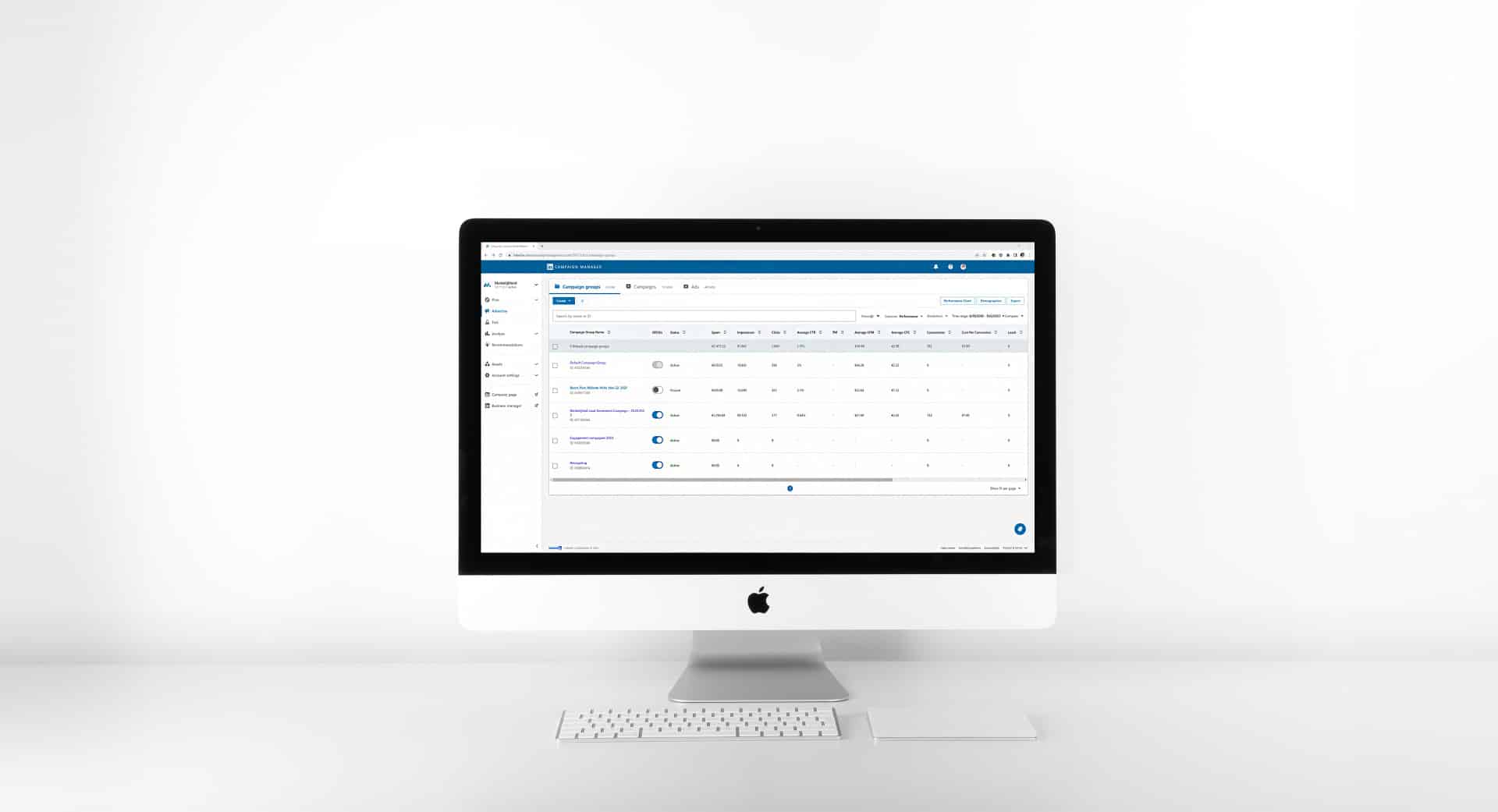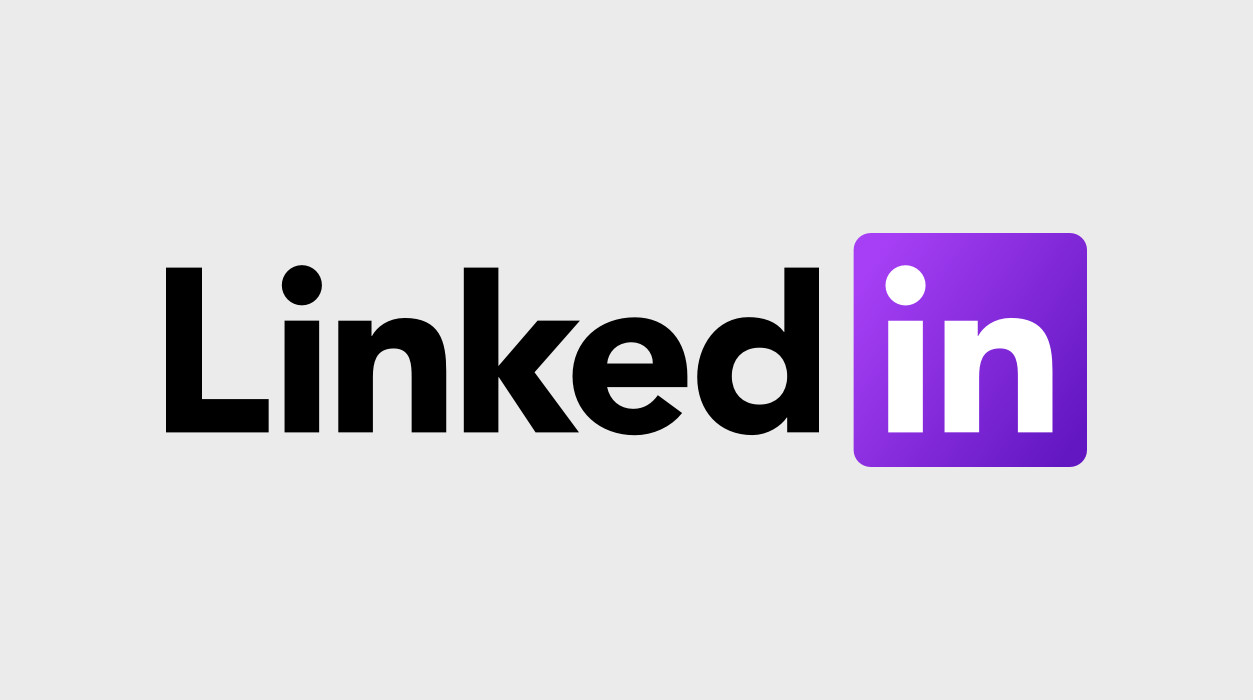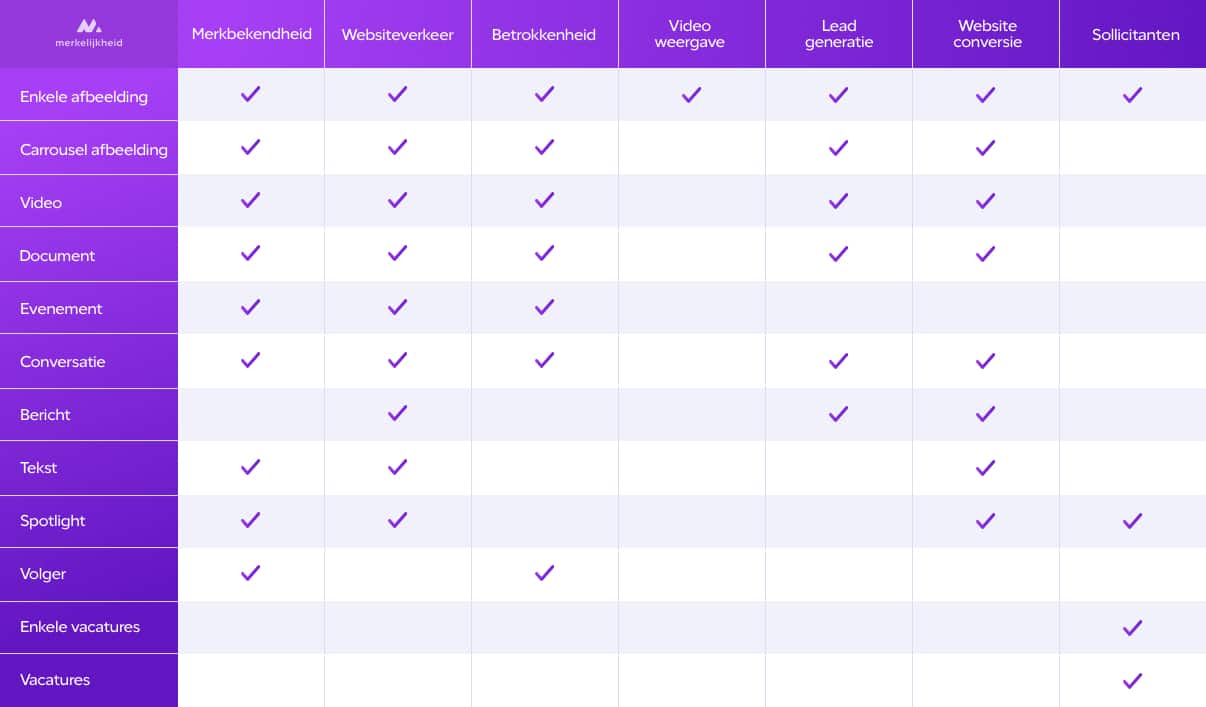*LinkedIn Advertising
Advertising on LinkedIn: a step-by-step guide to get started

Wondering how to start advertising on LinkedIn? In this article, we tell you everything about advertising on LinkedIn. We explain the steps to launch your first LinkedIn campaign, the opportunities advertising on LinkedIn offers, what to consider, and finally, how to optimize your campaign.
First things first, to advertise on LinkedIn, you need a company page and a LinkedIn advertising account linked to a payment method. Both can easily be created on LinkedIn. Once you have these basics set up, you can start with your first campaign. In this article, we cover the following about LinkedIn advertising:
- Creating a LinkedIn Advertising Account
- Determining the Ad Format: Campaign Goal and Message
- Compiling Your Target Audience
- Setting a Budget
- Using LinkedIn Campaign Manager
- LinkedIn Insight Tag
- Launching a Campaign
- Optimizing a LinkedIn Campaign
Creating a LinkedIn Advertising Account in Campaign Manager

If you’ve already got a company page but perhaps haven’t set up a LinkedIn advertising account yet, no worries—it’s easy to do! Just hop onto LinkedIn and, at the top right, click on the nine dots labeled “for business”. This will open a menu where you’ll find the ‘advertise’ option among others. Clicking ‘advertise’ opens up a new tab: the LinkedIn Campaign Manager.
At the top left, there’s a blue button for creating a new account. Just follow these steps:
- Account Name
- Currency
- Linking LinkedIn Company Page
And just like that, you’ve set up an advertising account. But before you kick off any campaigns, there’s one more thing to sort out: billing. Head over to the ‘billing center’ under ‘account settings’ in your LinkedIn advertising account and input the necessary information.
Advertising on LinkedIn: Crafting Your Message
When you’re reaching out to your target audience on LinkedIn, your message and how you deliver it are crucial for the success of your campaign. Think beyond just what you want to say about your product or service and what you hope to achieve with the campaign. Also, consider what would resonate with your audience.
The Objective of Your LinkedIn Campaign
What’s your endgame with the LinkedIn campaign? You’ve got to nail this down to deploy resources effectively, but it’s also the first step in setting up any LinkedIn campaign. Plus, your objective influences the types of ads you can run. Here’s a quick rundown of possible campaign objectives:
- Brand Awareness: Get your campaign in front of as many people within your target audience as possible. Here, the focus isn’t on generating immediate actions or responses but on ensuring your ads are seen.
- Website Traffic: Aim to show your campaign primarily to folks in your target audience who are likely to click through to your site.
- Engagement: Max out actions and reactions from your audience. By actions, we mean any interaction with your ad, whether it’s a like, comment, click through to your company page, watching your video in full screen, scrolling through your document, or clicking through to your site.
- Video Views: Get your video seen by your target audience as much as possible. While similar to brand awareness, the difference here is the algorithm seeks out those most likely to watch your video for more than just a few seconds.
- Lead Generation: Generate leads right on LinkedIn with a form, allowing people to convert without leaving the platform.
- Website Conversions: Prefer to drive traffic to your site for conversions? This is the goal for you.
- Applicants: Looking to promote job listings and recruit new employees? Target potential applicants with this objective

The Message: Mediums, Text, and Imagery
What do you want to communicate to your audience, and which mediums are best suited for it? LinkedIn allows you to share various types of content, from images and texts to videos and whitepapers. Promoting a product can be as straightforward as guiding people to a landing page, but you could also showcase an instructional video or offer a factsheet.
Understanding Your Target Audience
You’re proactively reaching out to your audience before they start searching for a solution, product, or service. What do they need to see your message as valuable or to remember your brand? Keep in mind that part of your audience may not be familiar with your brand yet. Tailor your message accordingly. LinkedIn’s targeted audience options enable you to craft a message that perfectly matches their needs. Consider launching a brand awareness campaign before moving on to lead generation, or introduce your latest product with a video before driving traffic to your webshop. This approach helps warm up your audience to your brand before hitting them with an offer or request.
Building Your LinkedIn Target Audience
Who are you trying to reach? LinkedIn allows you to define your target audience in several ways. Basic information about your audience, like their location and language, is a given (you can choose one language but multiple geographic areas per campaign). Geographic details can be specified as a country, province, state, region, or city, and you can mix and match these as needed.
You can also build your audience based on job function, years of experience, skills, field of study, company size, industry, and company name, allowing for a variety of ways to define the same audience. Hence, think carefully about who you want to reach and what common traits they share.
Additionally, you can create retargeting audiences from various sources, such as your website or previous campaigns, and upload lists, like those from your CRM system or newsletter contact list.
Setting Your Budget for LinkedIn Advertising
How much are you planning to spend on LinkedIn advertising? Consider factors like:
- Target audience size
- Number of advertising phases
- Ad format
- Campaign duration
Aligning your budget with the audience size can significantly improve campaign results. An inadequate budget means a large part of your target audience might not see your campaign at all or only once. Like with any other campaign, repetition is key on LinkedIn. How many brands or ads do you recall after seeing them just once? Spend some time to align your audience and budget or consider increasing your LinkedIn budget.
Audience Size
Aligning your budget with your audience size isn’t a necessity, but doing so significantly improves campaign results. If your budget is insufficient, a large portion of your audience might only see your campaign once or not at all. Just like with any other campaign, repetition is key on LinkedIn. How many brands or ads do you remember after seeing them just once? Therefore, invest some time in matching your audience and budget, or consider allocating additional funds to LinkedIn.
Number of Advertising Phases
How many different advertising phases do you need to disseminate your message across your target audience? For instance, if you opt for a video, a blog, and a whitepaper, then you require three distinct advertising phases.
Impact of Campaign Objective on Budget
The campaign objective also plays a crucial role in determining the budget. Generally, a more valuable objective leads to a relatively more expensive campaign on LinkedIn. For example, the costs for engagement and brand awareness campaigns are lower compared to campaigns aimed at website traffic or lead generation. This is one of the reasons we often start with a brand awareness campaign—it’s the most cost-effective way to optimize your target audience.
Campaign Duration
Duration matters because LinkedIn mandates a minimum budget of €10 per day. This doesn’t mean you’ll spend exactly €10 every day, but it often turns out that way. Therefore, you should plan for at least €10 per day. Duration is also crucial because not every LinkedIn user logs in daily; a longer campaign duration almost always ensures a broader reach within your target audience.
Advertising with LinkedIn Campaign Manager
The LinkedIn Campaign Manager lets you manage your ad account and ads, build campaigns, and analyze campaign results. The interface is straightforward, featuring a menu on the left where you can switch between different sections. The most used sections are:
- Planning: Here, you’ll find an overview of your audiences, both saved and “matched” based on retargeting or external data. This allows you to dive deeper into your audience’s data, identifying interests and relevant products. After creating an audience, you can see, for example, which companies, job functions, and skills LinkedIn associates with your audience. Use this to your advantage! Does LinkedIn’s data match the audience you have in mind, or do you need to make adjustments?
- Advertising: The core of your campaign manager, where you build campaigns and ads and view the results.
- Analysis: Here, you’ll find your LinkedIn Insight Tag. If you’re creating audiences based on your website traffic with the Insight Tag, you can view data that LinkedIn feeds back, such as companies, industries, and job functions of your website visitors.

LinkedIn Insight Tag
The LinkedIn Insight Tag is a piece of JavaScript code that links LinkedIn with your website for deeper insights. It allows you to track conversions on your website within LinkedIn and link them to specific campaigns and ads. Another advantage is that it enables you to create retargeting audiences based on your website traffic, targeting only those who have previously visited your website. To use this, your audience must consist of at least 300 people. The Insight Tag can be installed directly into your website’s code or through a tag manager.
Launching a Campaign
Now that you’re familiar with LinkedIn’s components and the decisions needed to design a campaign and ad format, it’s time to launch a campaign. Follow these steps in the LinkedIn Campaign Manager to launch a campaign:
- Choose an ad group.
- Name your campaign.
- Select a campaign objective.
- Define your audience.
- Choose an ad format and placement.
- Input your budget.
- Set up conversion tracking.
- Create your ads.
- Review all your settings one more time and launch the campaign.
Your campaign will first be reviewed by LinkedIn, usually taking a few minutes to an hour. After approval, your campaign and ads will go live. Then, it’s time for optimization. What should you consider?
Optimizing LinkedIn Campaigns
For analyzing and optimizing your LinkedIn campaign, check the advertising section. Here, you’ll find data on your campaign’s and ads’ performance, divided into categories like performance, delivery, and engagement, or specific to ad types like videos, documents, and messages. Finding the data you need might take some searching, but you’ll quickly get better at it.
Additionally, you can use the demographic report and performance report. The demographic report offers insights into your audience: who has seen your campaign? You can see, for instance, the companies they work for, their job functions, locations, and experience levels. The performance report shows a graph of various KPIs over the campaign duration, such as the number of impressions, reach, CPM, and CTR.
When optimizing, focus on the following aspects:
- How many people are you reaching, and does this match your audience expectations?
- What’s the CPM, and does it align with your expectations and budget?
- What are the engagement and CTR rates?
- How often does an individual see an ad on average?
- How is the campaign distributed among your target audience?
These are elements you can adjust to achieve the desired outcome.